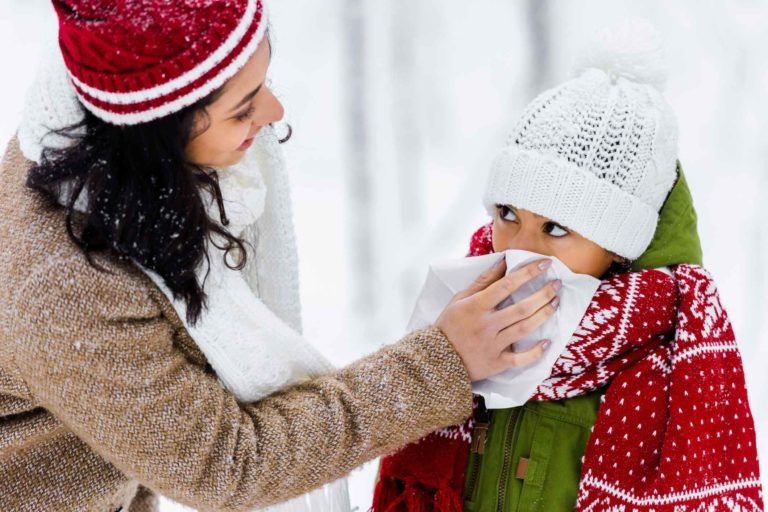
Your child comes home from school, and starts sniffling, complaining of a sore throat, and blowing their nose frequently. You know what this is – the common cold. But how can you treat it, relieve your child’s symptoms, and make sure you don’t get it?
Here are some tips for treating the common winter cold for kids.
Increase Air Moisture
The dry air that is common inside in the winter can make the effects of colds worse. So consider getting a humidifier to boost the moisture in your child’s room. This will help ease discomfort and symptoms like stuffy noses and sore throats.
Use Heat To Soothe Aches & Pains
Colds can cause aches and pains throughout the body. A warm electric heating pad or a sack filled with rice and placed in the microwave provides warmth which can help soothe the pain and comfort your child.
Use Petroleum Jelly To Soothe Raw Noses
Your child’s nose may become irritated and raw during a cold, due to frequent nose blowing. A little petroleum jelly helps keep it lubricated and soothed, preventing further discomfort.
Use Saline Drops To Help With Congestion
Saline drops can help lubricate nasal mucus and make it easier to expel, so this is a great option if your child’s nose is extremely stuffy.
Give Your Child Plenty Of Fluids
Dehydration is a common issue when your child is suffering from a cold. Runny noses and excess mucus production can cause a lot of water loss. Make sure your child drinks plenty of water or sports drinks.
Take Steps To Avoid Cold Transmission
You’ll want to make sure your child’s cold doesn’t get transmitted to you or other members of your family. You should do things like:
- Wash your hands after touching your child, and washing your child’s hands
- Avoid sharing any utensils, dishes or cups with your child
- Avoid picking up their used tissues
- Disinfect surfaces your child touches in the kitchen or bathroom
- Wash their clothes and bedding after the cold is over
Know How To Treat Your Child’s Cold!
With these tips from Pediatric Associates of Franklin, you can keep your child comfortable during their cold, and prevent their illness from spreading.
In most cases, there is no reason to bring your child to the doctor for a cold. However, if you notice things like a rising fever, symptoms that fail to improve, serious coughing and wheezing, ear pain, unusual drowsiness or a loss of appetite, you may want to bring your child in for an appointment – they could be suffering from further complications.
The information and content on our website should not be used as a substitute for medical treatment or advice from your doctor.




